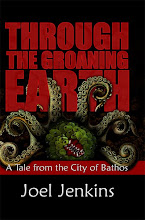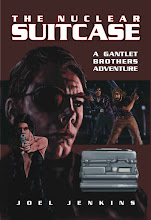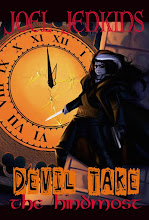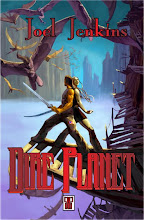Early on in my writing endeavors I found myself writing my characters or plot into corners, and I would have to discard 70 or 80 pages to get back on track. I found that plotting a detailed outline saved me lost pages and time. However, as I've grown more skilled my outlines have become sketchier and sketchier (more 'seat of the pants'), and I'm able to let the characters dictate the course of the story without losing my way. This leaves me plenty of room to discover characters and events, and to enjoy the surprising outcomes.
Detailed character sketches or “their character will be revealed to me as I write? Do you know your characters' goals, motivations, and conflicts before you start writing or is that something else you discover after you start writing?
I sometimes have preconceived notions about what a character is and what they should be, and then as I'm writing about them they let me know otherwise. Incidental characters will thrust themselves into the spotlight and make themselves integral to the story as I discover their true desires and motivations. Frederick Whalen was one such character—a bit of stunt casting, when I borrowed him from the novel Dillon and the Voice of Odin—who I thought was a typical bad guy in motivation, but turned out to be so much more.
Naegrik, the Galbran that Garvey Dire rescued from the pesthule cavern of a thousand hooks was a character who arrived unexpectedly and then forced himself into the story line. He'll appear again prominently in Lost Tribes of the Dire Planet, where a couple of other 'incidental' characters have let me know that I am entirely mistaken about them, and that they have plans and desires that will make them central to the plotline.
Books on plotting-useful or harmful?
It depends upon where your skills lie as a writer. There are plenty of 'character driven' works out there that are meandering and pointless. The trick is finding a balance where the characters drive the plot. If there is too little on the character side no one cares what interesting things happen to them. If there is too little on the plot side there is nothing interesting happening to the characters.
Do you write in bursts of creative energy, or can you sit down and write for hours at a time? Are you a procrastinator or does the itch to write keep at you until you sit down and work? Are you a morning or afternoon writer? Do you write with music/the noise of children/in a cafe or other public setting, or do you need complete silence to concentrate?
The reality of my life is that I don't have hours at a time to write, so I get up early and between getting the kids off to school I try to get some exercise and some writing done. I am able to write morning, noon or night but my schedule makes mornings the most feasible. If I am able to write just a page or two a day I end up with a novel by the end of the year. Consistency is what gets my novels finished. I don't wait for my muse to show up. If she's not there in the morning, I go out and find her. Music often helps me find my muse and lets me sink into my writing frame of mind more quickly.
Computer or longhand (or typewriter)?
Long hand has to be transferred into a typed manuscript at some point, and I prefer not to do the work twice. I can type much, much faster than I can write longhand and once the story is in digital format it is easily editable.
Do you know the ending before you type Chapter One?
Generally, I know roughly how things wrap up—but there are a lot of details that are revealed to me through the process of writing the story.
Does what's selling in the market influence how and what you write?
If one of my novels is selling better than another I may be prompted to more quickly write a sequel to that better selling novel, but other than that I pay no attention to what is selling in the market. I write stories that I might enjoy reading. I have a peculiar style that has been described by detractors as “highly descriptive prose”. I happen to take that as a positive description, but not everyone thinks so. Some people prefer spare prose with little color, but that's not what I enjoy reading or writing. I'll write what I feel and hopefully my writing will find the audience that enjoys highly descriptive prose.
Editing-love it or hate it?
A necessary evil. Editing is not my favorite part of writing, but it has got to be done.
Why do you write?
I feel compelled to write. It's a creative urge that I can't quell.
Why do you publish your work?
I'm just arrogant enough to think that other folks might enjoy the stories that I tell.
Do you like to write alone or do you like to work with others?
By its nature writing is a solitary endeavor and that has many advantages over some other creative endeavors. I've been in a number of bands, and in assembling a musical arrangement ( a song) you are dependent upon three or four other people and at the mercy of their schedules and creative inclinations. This can be very satisfying when all the elements come together, but most often differences of opinion make these arrangements short-lived. In writing you need only rely upon yourself and the creative inspiration from God to create a story, and though others may be involved in the editing and publishing end of things, the story is written or remains unwritten because of your effort or lack of effort.
That said, there are ways to collaborate in writing and I do sometimes find satisfaction in these. Devil Take the Hindmost is placed in the shared world setting of Denbrook, which was created by Mike McGee (writer of the most excellent El Gorgo comic book series). Derrick Ferguson's Diamondback novella (available from PulpWork Press) is also set in Denbrook and I find some sense of synergy in borrowing characters and events from Derrick's work to help populate Denbrook. You'll also see my character, Sasha Benbow, appearing in an upcoming Denbrook story from Derrick. However, there's only a few authors I'd trust to use my characters in their own work—and Derrick is one of them.
Though other collaborative writing has come to fruition (Immortals of the Cannibal Coast, with Martin Edward Stephenson, which appeared in Dark Worlds magazine), I've seen other projects languish in obscurity because my partner in collaboration didn't follow through. Any time more than one creative person gets involved in a project there is potential for friction and differences of opinion—so for expediency sake writing remains mostly a solitary effort, though I certainly do enjoy interacting with other authors.




















No comments:
Post a Comment